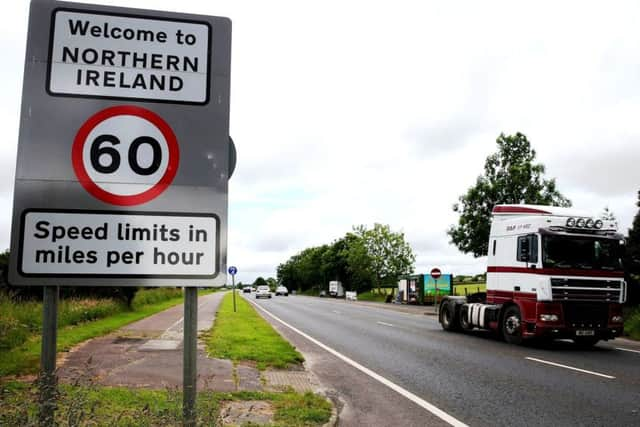How to resolve Irish border issue in a no deal Brexit
and live on Freeview channel 276
Second, there is what we might call the ‘Irish Sea border’, between Great Britain and the island of Ireland. There are currently controls on the importation of live animals into Northern Ireland from Great Britain.
Third, there is the ‘North-South’ border between Northern Ireland and the Irish Republic, including some 275 crossing points. This border (either side of which there are a large number of regulatory, tax and legal differences) is controlled via a combination of administrative cooperation, whistle-blowing, auditing, site raids by customs, tax and regulatory enforcement officials, occasional random spot-checks on roads leading up to and at the border (yes, that happens now), and cameras and other physical infrastructure at the border (yes, that is there already).
Advertisement
Hide AdAdvertisement
Hide AdOnce the UK leaves the EU, under all scenarios — whether there is a deal or no deal, and whether any deal includes a customs union or not — all three of these borders will continue. The question of the Brexit trade negotiations is how many additional controls will be required (eg will there need to be some mechanism to enforce tariffs or rules of origin checks), and the question of the Irish border negotiations is how, and in what balance between the three already-extant borders, any such additional controls will be implemented.


It is of particular interest, therefore, to ponder what might happen at these three borders in the event of no deal. Some UK press discussion suggests that the EU would impose stop-and-check controls at the border, akin to those at the border between the EU and Turkey. The EU could choose to attempt to do that, but that seems highly unlikely because of the sheer scale of the task (275 crossing points is more than the entire set of land crossing points between the rest of the EU and non-EU countries), because the Irish government claims it has been given undertakings by the EU that no such controls would be introduced, and because Ireland seems unlikely to be willing to allow such controls to be imposed even if the EU sought to introduce them.
Instead, in the event of no deal a much more plausible scenario would be: The EU would add additional stop-and-check controls at the Celtic Sea border, including tariff enforcement, rules of origin enforcement and regulatory compliance checks. This would ensure that any materials entering the rest of the EU from Ireland were compliant, reducing the task of North-South border controls to those necessary and proportionate for goods destined for Ireland itself. In a no-deal scenario, we should probably assume the Celtic Sea border checks would be one-way — i.e. the EU would not be checking that product was not coming from, say, Italy or Bulgaria, that was intended to enter the UK but was not compliant with UK regulations or tariff controls.
In no deal, the UK would presumably considerably increase its number of customs officials in Northern Ireland, making various random checks in factories and shops, auditing heavily and gathering intelligence so as to anticipate and intercept any smugglers, including potentially at the north-south border itself (but only when it had specific intelligence to do). The Irish government would presumably need to act similarly.
Advertisement
Hide AdAdvertisement
Hide AdThe Irish government and the Stormont assembly might choose (even in the event of no deal) to coordinate certain key regulations so as to balance the number of checks required at the Celtic Sea or Irish Sea borders and to obviate the need for any such controls at the North-South border. Unionists should not and would not object to Irish Sea border regulatory checks if those were purely the result of the Northern Ireland assembly itself choosing to make its regulations different from those in GB.


Once we grasp that this is how the Irish border would work in the event of no deal, we can ponder how to improve it.
First, an agreement to eliminate tariffs would reduce the need for tariff enforcement (though in a free trade agreement there would still be a need for rules of origin checks and controls). Second, in the event of no deal there would be collaboration between the EU and UK enforcement authorities, so presumably as well as checking compliance on products leaving Ireland at the Celtic Sea border, EU officials, with UK officials working with them, could check products entering Ireland at the Celtic Sea border that were intended to pass through into the UK. Similarly, EU and UK officials could work together at the Irish Sea border to check products entering Northern Ireland that were intended to pass on into the EU.
Third, in the event of a deal it seems likely that there would be more appetite both to grant powers to the Northern Ireland assembly to have autonomy over relevant regulations and to exercise those powers so as to shift some regulatory checks from the Celtic Sea border to the Irish Sea border. Provided that the precise extent of such a shift was flexible over time and was the choice of the Northern Ireland assembly, rather than being specified and fixed in detail in a Treaty, such an arrangement should be acceptable to Unionists and Leavers and in periods of both good will and reasonably similar attitudes to and goals of regulation, quite significant proportions of Celtic Sea border checks might move to the Irish Sea border. In other periods (e.g. of political tension or disagreement) and in particular sectors (e.g. if there were a new sector in which the UK took a different view on the best way to regulate it) the balance might shift back more to the Celtic Sea border.
Advertisement
Hide AdAdvertisement
Hide AdFourth, with a deal UK and Irish customs and regulatory enforcement officials could collaborate closely, with Irish officials permitted to do raids and spot-checks on UK sites (accompanied by UK officials) and vice versa.
Such an arrangement would allow the focus of “maximum facilitation” administrative and intelligence-based checks to be solely on the island of Ireland. That would be more practical than the need for UK and EU officials to check and raid potential smugglers across the entire EU.
The above proposal could work, it could be designed so as to be acceptable to unionists and Leavers, and it could be an improvement in terms of EU Single Market integrity and the integration of Ireland into the EU Single Market on what would happen in the event of no deal.
It now remains to be seen whether the EU would be willing to accept such a proposal in advance of no deal, or whether it would need to see what new post-Brexit reality emerged at the Irish border in the event of no deal before it saw the advantages of the scheme. Either way, I believe this is clearly the way forward.
Dr Andrew Lilico is executive director of the consultancy Europe Economics, and lead economist for Leave campaign